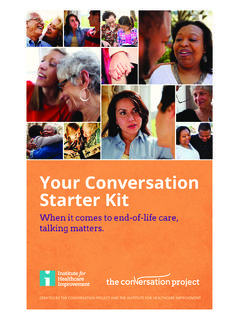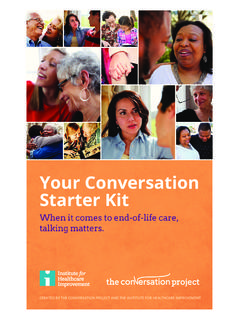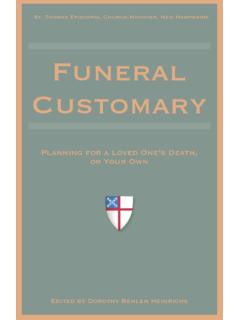Transcription of Your Conversation Starter Guide - Have You Had The ...
1 Your Conversation Starter GuideHow to talk about what matters to you and have a say in your health care. 2021 The Conversation Project, an initiative of the Institute for Healthcare Improvement (IHI)The Conversation Project Institute for Healthcare Improvement can t plan for everything. But we can talk about what is most important in our life, and in our health care with those who matter most. We ll help you take it step by with the important people in our life can bring us closer together. It also helps us create the foundation of a care plan that s right for us a plan that will be available when the need Conversation Project wants to help everyone talk about their wishes for care through the end of life, so those wishes can be understood and respected. We created this Guide to help you start a Conversation (and keep talking) so you can have a say in your health care today and s also important to choose what s known as a health care proxy, or health care advocate someone who would make health care decisions on your behalf if you became unable to voice those decisions yourself.
2 Visit our Guide to Choosing a Health Care Proxy for guidance on picking a proxy. You can take your time! There s no need to say everything that matters in one Conversation you can start talking, then keep talking. It s all about what works best for 1 Think About what Matters to You ..3 STEP 2 Plan Your Talk ..4 STEP 3 Start Talking ..8 STEP 4 Keep Talking ..11If you are completing this document on a computer, first save it to your desktop with a name you can easily find again. Then open your saved document and type in your answers. (Otherwise, what you type will not be saved.) Completing it on your computer will create a digital document that you can easily share with document does not seek to provide legal advice. 3 The Conversation Project Institute for Healthcare Improvement IDEAS Think About what Matters to YouSOME IDEASSOME IDEASWhat or who supports you during difficult times?Try finishing this sentence: what matters to me through the end of my life does a good day look like for you?
3 STEP 1 To get ready to talk about what matters to you and your wishes for care through the end of life, it s helpful to gather your thoughts as a first step. You don t need to have the Conversation just yet. Here are some helpful ways to think about what matters to you and prepare for your Conversation . That s your what matters to me statement. Sharing it with people you trust could be a big help if they need to communicate with your health care team one day. They may need to share what s important to you and what you need to be able to have a good day. They also may need to decide what type of treatment you d want to receive. Completing this Guide will help you refine what you want them to know about what matters to it time with family or friends? Enjoying favorite everyday activities? what do you need to enjoy a good life through the end of life? Your faith, culture, family, friends, petsBeing able to recognize my children; being independent; being able to spend time with the ones I loveThe Conversation Project Institute for Healthcare Improvement Your TalkSTEP 2 Having a say in your health care is more likely if you share how you feel about certain situations that could arise now, in the future, and toward the end of life.
4 For each statement below, mark the place on the line that is closest to what you think or believe about each statement now. There are no right or wrong choices your answers are about what works for you. As a patient, I d like to Only the basics about my condition and my treatmentAll the details about my condition and my treatmentWhen there is a medical decision to be made, I would health care team to do what they think is bestTo have a say in every health care decision what are your concerns about medical treatments?I worry that I won t get enough careI worry that I ll get too much care5 The Conversation Project Institute for Healthcare Improvement know how quickly it is progressing or my doctor s best estimation for how long I have to liveUnderstand how quickly it is progressing and my doctor s best estimation for how long I have to live Any other notes you want to add?If I am diagnosed with a serious illness that could shorten my life, I would prefer If you were seriously ill or near the end of your life, how much medical treatment would you feel was right for you?
5 I would want to try every available treatment to extend my life, even if it s uncomfortableI would not want to try treatments that impact my quality of life in order to extend my life Where do you prefer to be toward the end of life?I strongly prefer to spend my last days in a health care facility (hospital, assisted living, or nursing facility)I strongly prefer to spend my last days at home The Conversation Project Institute for Healthcare Improvement I want to be aloneI want to be with other people Now, look at your previous answers. what do you notice about the kind of health care you said is right for you? If you weren t able to speak for yourself, would you want people to follow all your wishes or do what they think is best in the moment?I want the people I trust to do exactly what I ve said, even if it makes them uncomfortableI want the people I trust to do what brings them peace, even if it s different from what I ve said When it comes to sharing information about my health with I don t want those close to me to know all the details about my healthI am comfortable with those close to me knowing all the details about my health 7 The Conversation Project Institute for Healthcare Improvement what specific information would you want (or not want) shared with certain trusted people?
6 Look at your previous answers. what are the most important things for your friends, family, and health care team to understand about what matters most to you through the end of life? The Conversation Project Institute for Healthcare Improvement (s)Spouse/par tner(s) Chosen family member(s)Adult child/childrenFaith leader (minister, priest, rabbi, imam, etc.)Trusted friend(s)Doctor(s)Nurse practitioner/nurse(s)Social workerOther: At the kitchen tableAt a favorite restaurant In the carOn a walkVideo chat or phone callAt my place of worship Other: Who needs to know what matters to you in your health care?Check all that apply:Where would you feel comfortable talking? The Conversation Project uses the saying, It always seems too soon, until it s too late. When will you start this Conversation ?Start TalkingSTEP 3 How much do the people who matter to you know about what matters most to you? There may be some things they already know, and other things that you need to tell them.
7 Sometimes we might think others know how we feel, but they don t. Conversations help make what we think and how we feel as clear as possible. 9 The Conversation Project Institute for Healthcare Improvement list doesn t cover everything, but here are some things you can say to start talking. I need your help with something. Can you and I have a Conversation about ? I was thinking about what happened to , and it made me realize . E ven though I m OK right now, I m worried that , and I want to be prepared. Can we talk about some things that matter to me? Will you help me think about my future? I heard about the Conversation Project and answered some of their questions about things that matter to me when it comes to my care through the end of life. I d like to talk to you about it. When died, do you think their wishes and priorities were respected toward the end of their life? You ve gathered your thoughts, written down your ideas, and picked your trusted people.
8 Now, how do you begin a Conversation ?Here is a list of some other things you may want to cover when you talk. Do you have any worries about your health? what do you need to address to feel more prepared (examples: finances, property, legal documents, relationships, health care situations)? Do you have any fears, concerns, or mistrust about where or how you receive health care? Who do you want (or not want) to be involved in your health care? When you look ahead to the future, are there important events or dates you hope you re there for? Are there kinds of treatment you would want or not want (examples: resuscitation attempts, ventilation, feeding tube)? If your health condition changed, when would it be OK with you to shift from trying to cure an illness to trying to enjoy the end of life as much as possible? The Conversation Project Institute for Healthcare Improvement for your talkImagine the Conversation in your mind first. You can even write a letter that explains your values about the kind of care that works for you to figure out words that feel comfortable for you to use.
9 You can also consider having a practice Conversation , so you feel as prepared as possible to have a real Conversation . You don t have to talk about everything or talk to everyone in the first Conversation . In fact, we suggest you keep talking over time! Be patient. Some people are nervous or may need time to get ready to talk. Every time you start a Conversation , it helps you come closer to making your wishes fully known. Keep trying. You don t have to lead the whole Conversation ; it s important to also listen to what the other person says so you can build trust. Nothing you say is permanent. You can always change your mind as things change in the future. You may find out during these conversations that you and your trusted people disagree. That s OK (no judgment!). The important thing is that you re talking now and to keep talking so you re prepared in case your health changes. You can share this Guide , with or without your thoughts included, with your trusted people.
10 11 The Conversation Project Institute for Healthcare Improvement TalkingSTEP 4 Now that you ve started the Conversation , keep going! Talk to more people who may have a say in your health care. The more you talk, the more people you are close to will know what matters to you. And that makes it more likely that you ll get the kind of health care you want now and through the end of life. Here are some things you can think about to keep the Conversation going. When would be a good time to talk again? what might you want to repeat or explain again, so you re sure your trusted people understand what s important to you?Who do you want to talk to next time? Are there people (such as family members who may disagree) who should hear things from you at the same time? what do you want to make sure to ask or talk about next time?SOME IDEASIt s a good idea to have another Conversation when life changes happen, such as the birth of a baby, when family and friends are together for a holiday or visit, before a trip, or when a health issue is getting harder to to do nextNow, it s a good idea to record your Conversation with an important legal document to be sure your choices are followed.








